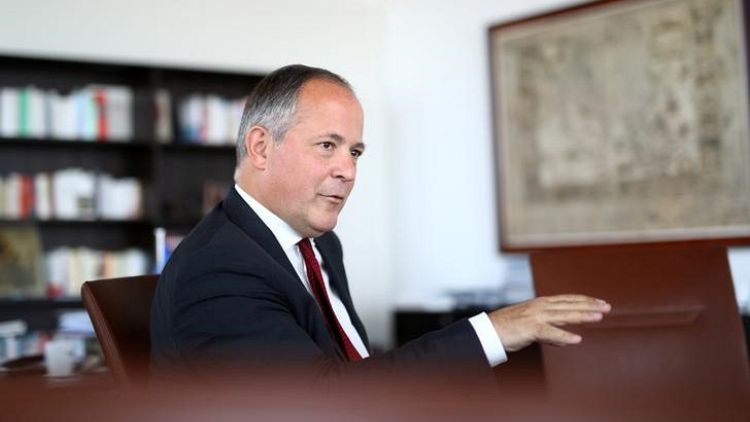By Shrutee Sarkar and Balazs Koranyi
BENGALURU/FRANKFURT (Reuters) - The best qualified candidate is unlikely to become the European Central Bank's next president given the political intricacies of the selection process and legal hurdles, a Reuters poll of over 50 economists suggested.
ECB board member Benoit Coeure is considered best-suited to take over from Mario Draghi when his term ends at the end of October. But former Finnish central bank chief Erkki Liikanen is regarded as the most likely winner of what is certain to be a political compromise among the euro zone's biggest powers.
As ECB policymakers traditionally line up behind their president, the position is unusually powerful in setting the policy agenda, a role Draghi mastered when he staved off the currency bloc's demise with a few well chosen words.
The election is also part of a wider reshuffle at the ECB with half of the board and more than a third of the Governing Council replaced this year, unusually high flux that could alter the bloc's monetary policy.
More than a third of poll respondents said Coeure, head of the ECB's market operations and a key architect of its crisis-era quantitative easing scheme, is the best person for the job while Liikanen and Bundesbank chief Jens Weidmann both received more than a fifth of the votes, the March 4-5 survey showed.
But when asked who was the most likely to win, well over a third of economists polled picked Liikanen, with the remainder almost equally split between French central bank chief Francois Villeroy de Galhau, Finnish central bank Governor Olli Rehn, Weidmann and Coeure.
"I think Olli Rehn or Liikanen, the Finnish candidates, (would win) more by default than anything else," Frederik Ducrozet, a strategist at Pictet Wealth Management said. "Coeure is well regarded and respected for his comprehensive range of expertise - macro and markets - especially, his knowledge of market operations."
While a majority of respondents polled said Coeure was likely to pursue broadly the same policy as Draghi, more than 60 percent said Liikanen was likely to be more hawkish.
The selection process is expected to start after European elections in late May and the ECB job is likely to be part of wider horse-trade of top jobs along with the head of the EU Commission and Council.
While both France and Germany have a qualified candidate for the ECB roles, there are also objections to both, raising the chance that a smaller country would manage to grab the position.
"I think Coeure is very well suited. (But) it's not the ECB determining who their new leader is," said Rabobank analyst Bas Van Geffen.
"It's going to be the European leaders and so the question is basically - what are the heads of states in Europe going to decide. If you want to go for a more neutral choice ... then we would think that Liikanen would be the middle ground."
LEGAL HURDLE, AGE
The next ECB president will have to carefully balance Germany's demand for policy normalization after years of central bank support and the need for further policy stimulus for other euro zone countries like Italy, which is in recession.
With global trade tensions already biting Europe's export focused industry, the ECB is already seen delaying a rate hike from record lows until 2020, a separate Reuters poll showed last week.
Still, both Coeure and Liikanen need to address some concerns.
As a sitting board member, Coeure is not eligible for the job and would have to resign first to gain eligibility. While this might be a feasible loophole, it is certainly not in the spirit of the law.
His nomination would also require French President Emmanuel Macron to pick him over the sitting French governor, a contentious move.
While Liikanen is well qualified, he will be 69 when he takes over and 77 when his term ends, older than any of his predecessors.
Liikanen has dismissed concerns about his age in the past, pointing to his history of long-distance running as proof of fitness.
Weidmann, who scored on par with Liikanen as the best-suited for the job, fared worse when it comes to the likelihood of his victory, a reflection of his persistent resistance to ECB stimulus, now credited with lifting the bloc out of crisis.
(Polling by correspondents in BENGALURU; Editing by Ross Finley and Andrew Heavens)



